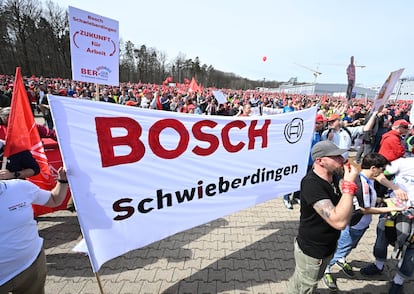Bosch’s auto parts business faces EV transition hurdles
The top automotive components manufacturer aims to stay competitive by cutting over 7,000 jobs


The shift to electric vehicles, along with low consumer demand, high inflation and a weakened global economy, has prompted Bosch, the German manufacturing giant, to initiate extensive staff restructuring. Bosch’s automotive parts and technology group anticipates challenging times ahead. “The coming years are going to demand a lot from all of us,” said Board Chairman Stefan Hartung at the company’s presentation of preliminary 2023 results in March.
Bosch saw growth last year with €91.6 billion ($99.5 billion) in gross revenue (up 8% from 2022), and €4.6 billion ($5 billion) in earnings before interest and taxes (up 5% from 2022). Hartung said that “2023 was more difficult than expected for Bosch, but we still we managed to increase sales and improve profitability. We made progress despite strong headwinds.”
Bosch management has recently announced plans to cut over 7,000 jobs worldwide, with up to 3,700 in Germany. Bosch hasn’t confirmed the exact global figure yet, as they’re still finalizing restructuring measures in various divisions. The auto parts group, with close to 430,000 employees, cites the need to stay competitive in challenging conditions marked by decreased demand. They aim to tackle excess capacity in various areas where ongoing challenges persist.
“The mobility sector transformation is significantly affecting the entire industry and Bosch’s business. The struggling global economy adds to the challenge of the transition. We encountered more obstacles than anticipated in 2023,” said Bosch human resources director Stefan Grosch. “In the consumer goods sector, market and customer demands are shifting as the DIY boom of the Covid era fades. Currently, there are job changes in the powertrain division, as well as in control units, vehicle electronics and software.”
Worker anxiety spurred 25,000 Bosch employees to demonstrate throughout Germany on March 20. The main protest was at the automotive group’s headquarters in Gerlingen-Schillerhöhe (near Stuttgart). IG Metall, Germany’s largest metalworkers union, reported that over 10,000 people participated in the demonstration. Bosch workers demanded an active role in the company’s transformation, and questioned large foreign investments while layoffs are ongoing. Last year, Bosch announced a nearly €1 billion ($1.09 billion) investment to make components for new energy vehicles in China, and is building another electric vehicle center in the Czech Republic.
Bosch, a company that has epitomized “Made in Germany” since its founding in 1886 in Stuttgart, has four main divisions: mobility solutions, industrial technology, consumer goods, and energy and building technology. Bosch is the largest automotive components manufacturer globally, but expects a slowdown in the sector.
The automobile industry’s transformation will significantly impact the entire sector in the medium term. The switch to electromobility for companies manufacturing EVs — bikes, scooters, cars, commercial vehicles — involves high up-front investments and needs fewer workers. Global economic weakness, persistent inflation due to rising energy and raw material costs, and negative exchange rate effects have aggravated the situation for companies in this sector.
A company that made over 60% of its revenue last year from the automotive sector (€56.3 billion or $61.2 billion) faces gloomy prospects. The transition from combustion to electric engines is an expensive venture. Bosch’s biggest customers are German automakers, which also face challenges from Chinese manufacturers competing in the European market.
Many jobs at Bosch are in the conventional combustion engine sector, set to phase out gradually in the European Union by 2035. To ensure job security, the company reached an agreement with its workers last year to protect the jobs of around 80,000 employees at German plants until the end of 2027.
Bosch’s layoffs aren’t unexpected. Industry experts like Stefan Bratzel from the Center for Automotive Management (CAM) have long foreseen job cuts due to the transformation process. “These are very tough times for the auto industry, especially for suppliers. Years ago, we anticipated that the transition would result in about a 20% job loss,” Bratzel told Germany’s ARD broadcast network. He believes Bosch won’t be the only one announcing jobs cuts. “Maybe its shift to electromobility and connectivity was sluggish, but this applies to the entire German auto industry.”
Sign up for our weekly newsletter to get more English-language news coverage from EL PAÍS USA Edition
Tu suscripción se está usando en otro dispositivo
¿Quieres añadir otro usuario a tu suscripción?
Si continúas leyendo en este dispositivo, no se podrá leer en el otro.
FlechaTu suscripción se está usando en otro dispositivo y solo puedes acceder a EL PAÍS desde un dispositivo a la vez.
Si quieres compartir tu cuenta, cambia tu suscripción a la modalidad Premium, así podrás añadir otro usuario. Cada uno accederá con su propia cuenta de email, lo que os permitirá personalizar vuestra experiencia en EL PAÍS.
¿Tienes una suscripción de empresa? Accede aquí para contratar más cuentas.
En el caso de no saber quién está usando tu cuenta, te recomendamos cambiar tu contraseña aquí.
Si decides continuar compartiendo tu cuenta, este mensaje se mostrará en tu dispositivo y en el de la otra persona que está usando tu cuenta de forma indefinida, afectando a tu experiencia de lectura. Puedes consultar aquí los términos y condiciones de la suscripción digital.








































